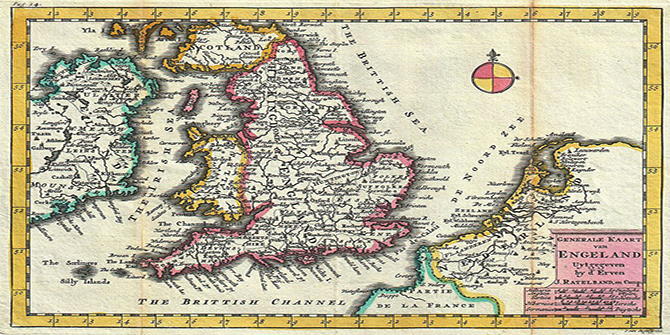 Michael Gove had a plan for all English schoolchildren. He wanted them to learn an account of British history in which his fellow nationals always went out into the world with a cheery optimism that comes from the good fortune of being born British and with the certainty that right was always on their side, writes Matthew Watson.
Michael Gove had a plan for all English schoolchildren. He wanted them to learn an account of British history in which his fellow nationals always went out into the world with a cheery optimism that comes from the good fortune of being born British and with the certainty that right was always on their side, writes Matthew Watson.
In the same week as I had an article published on the role of imperial ‘heroes’ in Conservative history curriculum reform, the pre-publication reviews of Jacob Rees-Mogg’s The Victorians hit the newspapers. The reviewers blew an enormous raspberry at Rees-Mogg’s attempt to justify his extreme Brexit stance through sketches of the achievements of 12 nineteenth-century ‘titans’ who, in his view, allowed Britain to punch significantly above its weight in world affairs. I was one of the few people to buy The Victorians in its first week on sale – for research purposes, of course – and it clearly deserves the derision that has been heaped upon it by reviewers of all political stripes. It depicts a ‘Boys’ Own’ fantasy of an imperial Britain whose passing has been increasingly mourned on the right and which now acts to propel the culture wars that have produced such worrying levels of contemporary political polarisation.
It would be a comforting thought if Rees-Mogg’s book could just be laughed at and dismissed. Yet consider it anew in the readily conceivable parallel universe in which Michael Gove, eminent Brexiteer and current contender to be the UK’s next Prime Minister, had got his way whilst Secretary of State for Education on the content of the history curriculum for English schools. Rees-Mogg’s amateurish tome would not, in those circumstances, have stood as testament to the anti-Gove position that there are any number of instances when it is a good idea to leave things to the experts. Instead, it would have done a serviceable impression of an authoritative school textbook. That is how close we came to future generations of English schoolchildren being taught that they can access the character that has made the modern country they call home most directly through memorising the feats of imperial ‘heroes’. The disconnect between a modern multicultural society and the idea that Britishness can only be understood in relation to white settlers subjugating indigenous populations is so glaringly obvious that it does not really require comment.
2013 now seems a very long time ago, but if we rewind those six years Gove was engaged in a bruising and ultimately losing battle with the majority of professional historians over the content of the English schools history curriculum. They accused him of having such a restricted historical sense that he was in no position to know how to distinguish a good curriculum from a bad one. He countered by saying that his passion for past narratives of Britain’s greatness made him every bit as much an expert as they were, but that unlike them he was not prepared to deprive young people of their right to learn why Britain has always been an exceptional country and a beacon of hope for the rest of the world. Their response was to muse that anybody who attached themselves to such an avowedly ideological conception of historical expertise really had no clue about the purpose of learning history.
Gove took an extreme Whig historical perspective on the question of curriculum design. He insisted upon an ‘island story’ that would locate a common thread of British history from the Magna Carta to the present day in liberal constitutionalism and parliamentary democracy. ‘Hurray for us and our political farsightedness,’ his preferred curriculum announced at every turn. ‘Hurray for Empire,’ it also extolled.
Conservative curriculum-makers have recently shied away from the subject matter of Empire, concerned that the formal process of 20th century decolonisation embodies a rupture which is difficult to explain from within their worldview. The imperial past is now much more usually the province of progressive curriculum-makers, who see within it an opportunity to tell an explicitly global history of Britain.
The polyvocality of such a history is something that young people repeatedly say they like, because it allows them to view their country and their heritage in the context of competing, contestable claims. Gove, however, was having none of this. His preferred curriculum was to have a single narrator’s standpoint (consistent with his own political views, of course) and a single narrative (again, that of his own choosing). Progressive curriculum-makers tend to embrace teaching Empire as a way of showing how formerly imperial heroes can have that status taken away from them as the dominant system of public morals changes. For Gove, by contrast, once a hero always a hero, and schoolchildren in modern multicultural Britain would be tested on how well they could recall the exploits of imperial adventurers.
In early 2014, David Cameron relieved Gove of his duties at the Department for Education, believing that his friend had become too divisive with a general election around the corner. Yet with division now the predominant feature of British political life, we should ask whether Gove was the ultimate winner of the culture wars over the history curriculum. After all, it has done no harm to Boris Johnson’s current status as favourite for the Conservative Party crown that he is on record saying that ‘The problem [with Africa] is not that we were once in charge, but that we are not in charge any more’. It is this climate of opinion that allows Rees-Mogg to secure a handsome contract for celebrating the imperial stewardship of Generals Gordon and Napier without thinking it necessary to mention the brutality with which they imposed British rule. Blowing raspberries at those eulogising imperial mythology is unlikely to be enough when the future, sadly, appears to be in their hands.
_____________
Note: the above draws on the author’s published work in British Politics.
About the Author
 Matthew Watson is Professor of Political Economy in the Department of Politics and International Studies at the University of Warwick and an Economic and Social Research Council Professorial Fellow.
Matthew Watson is Professor of Political Economy in the Department of Politics and International Studies at the University of Warwick and an Economic and Social Research Council Professorial Fellow.
All articles posted on this blog give the views of the author(s), and not the position of LSE British Politics and Policy, nor of the London School of Economics and Political Science. Featured image credit: Pixabay (Public Domain).








At the time when Gove was trying to introduce his news curriculum I wondered if ABCA was in his mind.
In the early 1940’s as the Army re-grouped after the Dunkirk evacuation Churchill was keen to introduce measures to increase the motivation of the British infantryman. It was decided that British service personnel were to be given lecture courses in current affairs organised by, amongst others, the Army Bureau of Current Affairs (ABCA).
So what sort of politics will interest men who are going to run up a beach into a hail of machine-gun fire?
Do you say something like “After the war we are going to implement the Beveridge report and its proposals for a strong social security system. The Butler Act will widen access to education. A National Health Service will be introduced. Europe’s nations will come closer together to prevent another war” ?
Or do you sing the praises of the 1930’s ? “Low wages, weak unions, hire and fire on a whim, patchy healthcare/education. We’ll keep Europe balkanised to encourage nationalism…”
For the ABCA lecturers it was a no-brainer. Anyway it was what the soldiers wanted to discuss in their current affairs lectures.
It had never happened before: millions being exposed to ideas of social justice and international co-operation coming from the authority figures of ABCA and its equivalent in he other services. The many Conservative newspapers of the 1930’s had never publicised ideas like that; they were far too dangerous.
Conservative MP’s quickly began howling at the content of the Army’s political debates. Maurice Petherick MP wrote to Chuchill’s PPS: “I am more and more suspicious of the way this lecturing racket is run…for the love of Mike do something about it, unless you want to have the creatures coming back all pansy-pink.” It made no difference: too many WW2 servicemen were being told by their fathers “We were told we were coming back to a land fit for heroes to live in. It didn’t happen. Don’t let the Tories screw you like they did to us after WW1″.
After the war though when the lectures were long forgotten and Labour said that a biassed British press gave the Tories a massive advantage, the Tories—their howls over a biassed ABCA also long forgotten—accused them of patronising an electorate who were well able to make up their own mind without the help of newspapers.